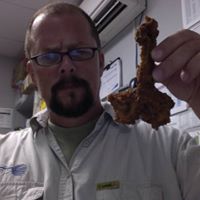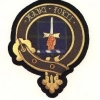Leaderboard
Popular Content
Showing content with the highest reputation on 02/13/2010 in all areas
-
My fault... it was intended as a funny remark, no offense intended! I'm sorry if you felt it was disrespectfull! I don't doubt that many paramedics have the knowledge and education necessary to fully and completely evaluate and treat their critical patients: my post wasn't intended as a paramedic bash... We're talking about education, and specifically about whether such thing as BLS and ALS care exists: most of the posters here expressed the view that patient intervention should be seen as a continuum, non categorized as advanced or basic. I completely agree. However it makes my self think: if field iterventions are considered as a continuum, why field care in itself is considered to be separate from hospital care so much that a dedicated provider has to exists? Why those that traditionally provide general medical care to the community (that is physicians and nurses) don't do it in the field too? Why do you feel this is appropriate? Please consider this as an honest question, as in my part of the world all medical interventions are performed by nurses and MD, wheter it is in a operation room, a GP office or in the back of an ambulance or an helo... And tniuqs, I never implied that you don't need the tools... I just said that the discussion was about education, not about skills... I agree sometimes there may not be any difference, sometimes however it might... in my system for example I can refer my patient to their GP, I can treat them on scene. I'm not restricted to any protocol, I can have my own drug choice to carry on the ambulance; when I bring a patient to the ER I can continue my care until I have done all diagnostic and stabilization required and he is ready to be admitted to the hospital, so that he actually had one single physician who took care of him from the field up untill he is admitted to the ward... As the implication that a physician would lenghten the time on scene, being an emergency physician means also that you have to know when you can stay and play and when you have to get going... after all I'm not some internal medicine doc who won't start treatment untilhe has done recording the pt. full family history!1 point
-
I believe both types of answers are correct here. Some have said discontinue and apply your NRB, and this may be correct if they're breathing poorly secondary to say, a seizure or a syncopal episode, as most often they'll come around and breath fine on their own. In most cases though, I'm with Jake. Something made their breathing get froggy and the likelihood is that you didn't correct that simply by assisting them with a few ventilations. Whatever was broken is likely still broken so assistance will need to be continued. I've assisted ventilations many times on pts that were able to talk to me simply because they looked so exhausted that I didn't want them to burn additional physiologic resources with the effort to breath. If in doubt, continue to assist. If it's too much, for too long, they'll simply reach up and pull the mask of and tell you to stop. Sure. But what about your other mechanical options? Why should you use NPAs and OPAs in this patient? Why not? I ask you this because I want you to think about your pt here, and not the book. Each time you identify an issue, decide what you should do about it and then try and make an argument for why you shouldn't do it. In this way you should be pretty comfortable with your decision. In this case for example my little pea brain would work something like this... What does my pt need? To be ventilated. What method should I use to open the airway? Jaw thrust chin lift. But the scene and pt presentation makes trauma a likelihood so I think I'll use the jaw thrust instead. Should I use an NPA? It will likely give me additional air movement with less cranking on the head, so yes. Why shouldn't I? I can't think of any reason. Should I use two? Why not? I can't think of any reason. Should I use an OPA? It seems like a good idea. Why shouldn't I? I can't think of any reason. Now you've got a pt with two NPAs and one OPA and everyone around you thinks you're a complete idiot, until you get into the ER and the doc says, "Nice!" See, he wants air movement and cares not one wit what it looks like or what the book says. We moved air, that was our job, and we used all of the tools we had available to do so, considered all of our contraindications for doing so, and that is our job. Right? Can you rethink this and see if you can explain why this isn't the most logical order of events? (Note, you won't find this answer in your book.) Most wouldn't consider the head tilt chin lift so much a change in position as a maneuver. Why would you change this pts position? Because we're concerned with two things most often when we go to the nursing home. First, this pt will likely have a pillow under their head causing a significant kink in the neck adding to the airway compromise already present because they're unresponsive and their tongue is being allowed to go where it likes. Second, it's likely that this pt has some fluid in their lungs. Sitting them upright will not only put the lungs in a better position to inflate with less effort, but will drain some of this fluid into the bases freeing up some alveolar space. Always, always, always sit your geriatric breathing pts up if there is no contraindication to doing so. This pt may die, but you didn't kill him. You didn't, in this scenario, do everything completely correct, but then, welcome to the world of EMS babe. Sometimes we make mistakes, sometimes they are big, other times small, but often people suffer from them. The sin is not in making mistakes but failing to learn from them and repeating them. Very brave of you to put forth your questions and your answers instead of doing as so many do and asking the questions but then staying safe behind your computer while you get answers from others first. EMS takes cast iron ovaries at times, good on you for putting yourself and your ideas out there to be judged. You did good. Dwayne THANK YOU! Man, I hate this argument, but for the very reason you state. First, you're never going to see this. You're going to hear about it a gazillion times, people are going to swear that it happens to them weekly, but you're almost certainly never going to see it. Second, if you do see it? OMG what then?? As you said, you bag them to the hospital. First week of basic class right? When people warn you about this you really need to call bullshit and be thankful that you got your info from EMTCity instead of from some yahoo wannabe making up stories. Dwayne1 point
-
1 point
-
you did very well. 1) assisted ventilations can be stopped if the patients respiratory drive kicks in and they start breathing better. If thier respirations become adequate 100% O2 by NRM is fine, but watch them carefully. 2) jaw thrust is correct because of the unknown trauma. 3)suctioning and repositioning is correct. oropharyngeal if no gag reflex. BVM with 100% O2 to assist. listen to lung sounds...it may be an exacerbation of the COPD or unresolved pneumonia. you also have a change in mental status out of the norm for this patient. seriously consider ALS intercept if your partner isnt an ALS provider. You didnt kill your patient...hope you are enjoying the class1 point
-
1- if the breathing BECOMES adequate, assuming the avg rate 14-18bpm you may stop BVM ventilation and place them on an NRB. You dont want to force air into sombody breathing normally. Just because the breathing is labored or shallow does not nessicairly mean that breathing is "inadequate". 2 - according to the "book" you supposed to automatically suspect the patient fell or what not ie trauma, so go with the jaw thrust and last i checked as a BLS provider you should always place a BLS airway, NPA or OPA. 3 - suction, reposition the airway, BVM if the repositioning of the airway does not improve the patients respiratory rate. Keep in mind this is all text book garbage. Its difficulty to treat a paper patient. wait till you hit the field if you havent yet, it will come much easier. Just keep in mind Lung sounds are very important and the pulse ox is an "aid" to your assessment, dont treat the pulse ox, treat the patient.1 point
-
NOOOO... this is pulling me back to pharm and I'm really hating antibiotics right now. Amoxicillin falls under the category of aminopenicillins, which I don't have listed any complications beyond those general for all penicillins. Complications for penicillin: Hypersensitivity, including upto anaphalaxis. PCN is a hapten, so by itself, its not big enough to trigger an immune response or immune memory. However, when it's bound to other proteins it can trigger a response and cause the immune system to both the PCN-protein complex as well as to PCN itself (however at a much lower rate than the complex). Super infection (c-diff) Seizures A hypersensitivity like reaction in patients with syphilis (Jarisch-Herxheimer Reaction). Diarrhea1 point
-
I have found that the only way I know I know a subject, is if I can explain it to someone else. I also write stuff over and over and over. I will write notes while reading, during lectures, labs, workbooks, etc. Then I find a poor soul like my husband or kids, and explain it to them. If I do it correctly, I know it has clicked! Good luck1 point
-
When you follow the sarcasm with makes me want to puke really does not lend credibility to your position.1 point
-
My question is why would you start an endeavor without seeing what is required? Before investing time or money the wise person researches.1 point
-
I think ALS providers learn about more potential diagnoses for a given symptom or set of symptoms than BLS do, so that certainly affects assessment. I know from my own experience that the number of potential causes of chest pain at least doubled if not tripled between what I got during my EMT-B school (one of if not the best in the state at the time) and my ALS course.1 point
-
Admittedly there are some combined Fire/EMS services in Canada. The fact that they currently exist is not an indication that they should continue to exist. If paramedicine is going to move forward and grow as a profession it must align itself more closely with the practices of other medical professions. I don’t hate firefighters. I’m good friends with a few of them in fact. If I had wanted to become a firefighter I would have gone to fire school. FRS friends of mine say much the same thing. If they had wanted to become a paramedic they would have gone to paramedic school. You are correct in saying that one of the IAFF’s roles is the promotion of firefighting as a whole. Where you’re incorrect is the assumption that pursuing EMS falls under the IAFF’s purview. Attempts to take over EMS are not being made to promote firefighting as a whole. Attempts to take over EMS are occurring because improvements in building codes have caused a decline in the number of FRS personnel required to cover a given area. The IAFF attempts to take over EMS operations directly violate the principles of union membership. They amount to an outright attack on members of other unions (for the most part in Canada). No, EMS is not doing the same thing. Paramedics are looking to expand their role into areas that currently don’t exist in most places. The original intent in the creation of paramedics was to make available to the public a healthcare provider capable of two important things; the provision of care at a scene outside of the hospital environment and the provision of care in transport.1 point
-
Again, this is an issue of education. The principle behind the idea of "BLS before ALS" is solid- you must master the building blocks and basic understanding of what you're working with before you move on to more advanced ideas and practices. The problem is that our education is not structured correctly. You are given the wrong building blocks at the BLS level and with that a false understanding of medicine. It is MUCH more important to understand the biology of medicine than it is to understand how to use a BVM or apply a LSB. Your patient history is one of your most important assessment tools, and if you don't have the correct understanding to inform how you go about your line of questioning, you're simply muddling around and missing the point. Anyone can be trained to master the physical skills of medicine... whether it's IV's, intubation, cardiac monitor placement... not everyone has the capacity to figure out how it all fits together at the level which allows you to make sound treatment decisions. I will, however, say that once you master the intellectual part of it you must also master the physical skills... because knowing what's wrong does you no good if you're incapable of performing the right actions to treat it. BUT! Without the correct thinking, all the skills in the world are useless to you. Wendy CO EMT-B1 point
-
Well said. Not sure who Jaime is, but ok. The context of this post I assume is directed towards the original poster, which was me. Thanks for the input, I'll form my posts more to your liking next time. I am after all giving your opinions ... I originally made the post to share the information I had read; a simple story of a horribly sad incident. I was rather speechless (rarely happens), and the story almost brought tears to my eyes. Does that explain my "lack of effort" as you put it? A brother of ours had the strength in his DYING moments to say thank you to 4 of his own. Unfortunately some people didn't read the story in its entirety, and the posting just went off in a completely different direction. You I'm sure have started/been a part of similar threads that meander. Please take your own advice and keep things civil when in a main forum. If you want to blab at me in private message go right ahead, I really don't care. I don't want to read through useless bickering in a forum, and I'm sure others don't either. As for posting somewhere here, I will do so where I please as this is an open site and don't need an invitation to do so. Neither do you. I'm going to consider this matter1 point
-
So I decided to be the first one to make a topic for mad people. Seems as though some feel that a topic for a deceased brother is a good place to tell someone how ticked off you are. Well, I disagree. Several topics here get so far away from the actual point, frequently due to someone misunderstanding and going on about how correct they think they are. So here's the perfect chance to air your frustrations about someone who's ticked you off in a topic, without that topic going wayyyy off track and having people make themselves look ridiculous. For those who want to participate, you can start with me. Who wants to go first? Oh, I should add ... keep the language clean of course!1 point
-
... and if you happen to have a Crestline with the killswitch under the dash and some idiot criminal knows about that, THEN what are you gonna do?1 point
-
1 point
-
One good point ... yes, you can get the 17 year old who takes 10 Tylenol ES because they had a fight with their boyfriend and is furious and depressed and all that good stuff. Or you can get that person who says they're depressed and are thinking about suicide, but no clear ideations. They're asking for help (fine, even though it's 3am and I haven't slept). I always trust my gut, as it's never been wrong. If I think we need po-po's along, I will request them. If not, I still ensure I have easy egress. It's usually the calls you least expect something to happen on that something happens ... like two medics on a random MVA last year, gun pointed in their faces by a possibly postictal patient. You simply never know.1 point
-
That was my question, why not chemically restrain but I guess there's the answer. Still, if he's still posing a threat during transport why not get the po-po's back? Another question which I think was already asked, was he of relatively sound mind? GCS 15 and posing no immediate danger to himself? If so, why was he transported? Did the family make up the story of him cutting himself with glass to get you there faster? If you have no spit hoods and the NRB wasn't staying on his face, try a pillow case (sans pillow). Your patient can still breathe just fine, but cannot spit on you1 point
-
Good point ... proper technique and *hopefully* normal findings can be taught on a classmate/friend/whatever. It would be good to learn on several different shapes and sizes, as 'normal' will feel different on each one. So once a student learns what is baseline/normal they can progress to learning what is abnormal. Yup! So, after a few hundred calls and several months or even a year or more of building on basic assessment skills, perhaps it's time to introduce something new (and in scope) if the EMT is ready. If not to practice, then at least for knowledge. Interventions of course come much later and with the additional class time.1 point
-
Sure it's probably safe to say that an entry-level practitioner does not have as much knowledge of pathophysiology as a paramedic does. So the entry-level person cannot interpret or treat their findings as someone of a higher level can. The way this situation in particular was handled while still on car in front of a patient however, was not appropriate.1 point
-
Some good points here. I still disagree however, with the original poster 'yanking' the EMT's hands away. Unless one felt it was an immediate life threat to the patient, a simple "hey hold off on that for now" could have sufficed. As a green practitioner who is learning the ropes, they need directions and explanations. As someone else already stated, if you didn't want your EMT assessing patients that should have been made clear PRIOR to the ridealong. Although EMS is an industry that tends to 'eat their young', remember that you were once green as well.1 point
-
Wow you're arrogant. What was your reasoning behind yanking your EMT's hands from the patient? Was there an obvious pulsating mass that they didn't recognize? You very likely made that EMT feel like a piece of crap, and for what? What could you possibly have taught them by acting out like that? Palpation is an important part of an abdo assessment, unless of course that action is contraindicated. Being an EMT is NOT a contraindication.1 point
-
I'm not an EMT yet, I'm just in my first month of class, but I would also emphasize what a previous poster said - you can not afford to use bad grammar or poor spelling or punctuation while applying for a job, ESPECIALLY given your age. They are already wondering if you are mature enough for this kind of life and death position - when you write like a first grader, unfortunately, that does not speak well for your maturity. Also - my teacher keeps emphasizing that it is extremely important to spell properly, because when you write out a patient report, if it is written poorly - 1) The patient may receive inadequate care because of it and 2.) If you end up in court, or even end up the subject of an internal investigation, and you have written a report that is riddled with errors - they will assume that you provided inadequate care because of your sloppy reporting skills. So when you are applying for these jobs and they see that kind of writing - what kind of documentation do your potential employers think that you will be providing with every run report? If I were you, I would: 1.) Improve your writing skills, including taking an English class at community college if you need to. Then, and only then, I would consider moving to an area where they either have volunteer ambulance companies that will allow you to ride with them at your age, or an area where they will hire you at your age. If you can only find an area that will allow volunteers - work somewhere else and keep your skills up by volunteering, and also make sure to keep your certification current. Yes, it means you have to wait a while, but sometimes you have to make sacrifices for the job that you want.0 points
-
Go to Paramedic School, then it wont be an issue. Your best chance is to apply at government agencies that are self insured if you choose to not go to medic school. The more rural and low-paying, the better your chances will be.0 points
-
-1 points
-
BLS before ALS you have to be an emt for a year atleast before you can start to be a medic.good emt skills is what makes a good medic.i dont give a damn if you are ALS is you cant to the basics then you are no good to me.think about how many ALS calls really go down on any given day,where i work(in manahttan) alot of calls get upgraded by the callers because they want an ambulance to get there faster but when you get there its bullshit. yes ALS is hard,i was in medic school til i got hurt at work and had to drop out but so is emt work.medics need us and we need the medics.alot of places double as bls/als and are usually run by fire and thats the true issue imo. if you are a fire fighter then thats great but the system should be kept seperate.ems should be run by someone who has medical traning and not by a fire fighter. getting back to which is better,neither is better,its what you know and how you do it.i can start a line,do the leads and push drugs better than some of these medics out here but i have seen als do better immoblization and basic bleeding control better than some of the techs who have been on the job for 20 years. if you are an medic then you need to keep up your emt skills because all als protocols say BLS interventions first and just because we are on scene there to help you otu doesnt mean have us do all of that because you dont want to.learn the new tricks from your emts as for the techs learn the simple things from the medics like how to spike a bag or how to put the leads on the pt. ems isnt going to go anywhere if we keep bashing eachother,als saves bls but its bls skills that saves als-1 points
-
How about I don't care about your silly non-american systems. In a big urban fire systems your emt's are firefighters and have very little but a fast ride to offer as patient care/skills. Paramedics are king here and minus burnout and laziness if you want advanced care you hope you get them. Get over the terms they are not going to change.-1 points
-
Tniuqs, Is this the Mclean's article you are talking about: http://www2.macleans...ed-by-the-bell/ Just so I know we are on the same page before I comment. Until then I have a few other questions. First, I am not sure I follow your argument about us (Canada) have a clear definition of what a paramedic is. Do you mean from an educational, scope of practice, and training point of view? If so I disagree, as after all the main discussion of this forum how we should decide on that very definition. Now, if you mean that definition is that paramedics in Canada only work for EMS and should be the sole providers, then again, I would have to disagree as certainly many municipalities deliver EMS under a combined fire/EMS system. Winnipeg, as you mentioned is one, Red Deer, and Lightbridge also come to mind. We also have paramedic who work in the hospital setting. Please clarify. Now onto the IAFF agenda. Their role, by definition should be to promote firefighting as a whole, is it not? What other agenda would they support? Yes, I will concede that fire's role is changing and with it they will be looking for new business, so to speak. It is a free country, and by all means there is no reason why they shouldn't proceed. Even if this means hurt feelings. Isn't EMS doing the same thing? Heck, we are not beating PAC up for advocating for the role of EMS are we? Wouldn't a congruent thought be how EMS is looking for new roles? Community paramedics, hospital based paramedics, injury prevention, and so on? What's the difference?-1 points
-
BSI? PPE? Forget that! My only study tip is to find a local EMT/Paramedic and ask them to help you, they know the in's and out's of your local system, and the things the local test push!-1 points
-
Ok so i Just got my county Certification In california,Sacramento to be more Specific, And im 19 Years old and i really would love to start working I Have had a job sense i was 16(this job is not in the healthcare field) consistantly hard worker, Ive applied to every ambulance company in Sacramento approx. 6 but there are a few i ignored and some i applied to even though they said the same thing as the others..... must be 21 or older.... now this really is a downer to me, and none have called back or when i call just tell me the will get back to me theres nothing more i want to do then get on an ambulance and start working and helping people, but well voluntering is not an option for me, almost no agency accept volunteers and also i have to work to live i dont have parents. Please any assistance,tips ,advice, help on this would be amazing thank you.-1 points
-
Thank you guys for all the advice and such,I have found one lead so far .but its only part time.and so id still need to find another job but I'm very excited and hopeful,I have applied at all the hospitols in my are only on is currently hiring an er tech the others all require emt-2(paramedic) to work there. But hopefully that one calls me back I am looking forward to the oppertuniuty I have been givin and hope I can impress the company. Thank you for all the advice again and please if anymore keep on giving:) thank you Sincerly ,SacEMT ,Darrell Daniel.-2 points











